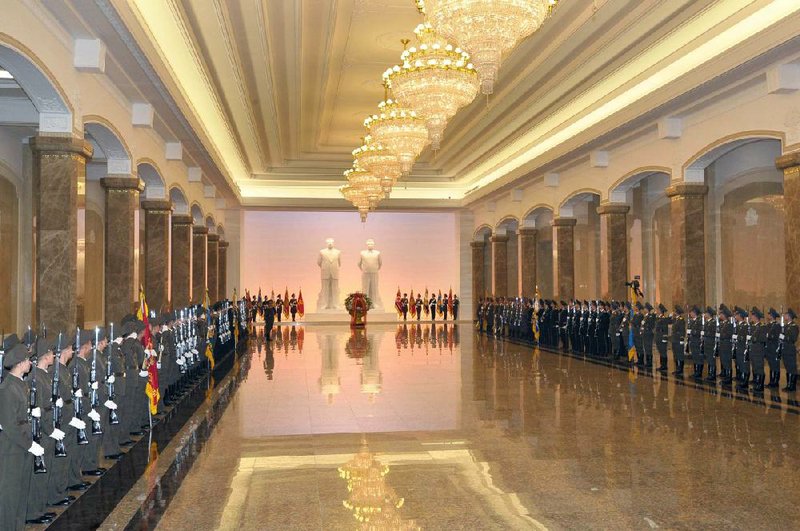PYONGYANG, North Korea — North Korea unveiled the embalmed body of Kim Jong Il, still in his trademark khaki jumpsuit, on the anniversary of his death Monday as mourning mixed with pride over a recent satellite launch that was a long-held goal of the late authoritarian leader.
Kim lies in state a few floors below his father, national founder Kim Il Sung, in the Kumsusan mausoleum, the cavernous former presidential palace. Kim Jong Il is presented lying beneath a red blanket, a spotlight shining on his face in a room suffused in red.
Wails echoed through the chilly hall as a group of North Korean women sobbed into the sashes of their traditional Korean dresses as they bowed before his body. The hall bearing the glass coffin was opened to select visitors for the first time since his death.
North Korea also unveiled Kim’s yacht and his armored train carriage, where he is said to have died. Among the personal belongings featured in the mausoleum are the parka, sunglasses and pointy platform shoes he famously wore in the last decades of his life. A MacBook Pro lay open on his desk.
North Koreans paid homage to Kim and basked in the success of last week’s launch of a long-range rocket that sent a satellite named after him to space.
The launch, condemned in many other capitals as a violation of bans against developing its missile technology, was portrayed not only as a gift to Kim Jong Il but also as proof that his son Kim Jong Un has the strength and vision to lead the country.
The elder Kim died last Dec. 17 from a heart attack while traveling on his train. To honor him Monday, North Koreans stopped in their tracks at midday and bowed their heads as the national flag fluttered at half-staff along streets and from buildings.
Tens of thousands of North Koreans gathered in the frigid plaza outside the mausoleum, newly transformed into a public park with lawns and pergolas.
Speaking outside the mausoleum, renamed the Kumsusan Palace of the Sun, the military’s top political officer, Choe Ryong Hae, said North Korea should be proud of the satellite, calling it “a political event with great significance in the history of Korea and humanity.”
Much of the rest of the world, however, was swift in condemning the launch, which was seen by the United States and other nations as a thinly disguised cover for testing missile technology that could someday be used for a nuclear warhead.
The test, which the U.N. Security Council said violated a ban on launches using ballistic missile technology, underlined Kim Jong Un’s determination to continue carrying out his father’s hard-line policies even if they draw international condemnation.
Washington said Monday that it has no option but to seek to isolate Pyongyang further.
“What’s left to us is to continue to increase pressure on the North Korean regime, and we are looking at how to best to do that, both bilaterally and with our partners going forward until they [North Korea] get the message. We are going to further isolate this regime,” U.S. State Department spokesman Victoria Nuland said.
Some outside experts worry that Pyongyang’s next move will be to press ahead with a nuclear test in the coming weeks, a step toward building a warhead small enough to be carried by a long-range missile.
Despite inviting further isolation for his impoverished nation and the threat of stiffer sanctions, Kim Jong Un won national prestige and clout by going ahead with the rocket launch.
At a memorial service on Sunday, North Korea’s top leadership not only eulogized Kim Jong Il, but also praised his son. Kim Yong Nam, president of the Presidium of North Korea’s parliament, called the launch a “shining victory” and an emblem of the promise that lies ahead with Kim Jong Un in power.
In a sign of the rocket launch’s importance, Kim Jong Un invited the scientists in charge of it to attend the mourning rites in Pyongyang, according to state media.
However, a U.S. astronomer reported Monday that the satellite is out of control and most likely dead.
“It’s tumbling, and we haven’t picked up any transmissions,” said Jonathan McDowell, a Harvard astronomer who tracks global rocket launchings and space activity. “Those two things are most consistent with the satellite being entirely inactive at this point.”
North Korea’s state-run media said nothing about the satellite’s dysfunction, which McDowell said will not cause the spacecraft to fall quickly back to Earth.
Information for this article was contributed by Hyung-jin Kim, Matthew Pennington and staff members of The Associated Press and by William J. Broad and Choe Sang-hun of The New York Times.
Front Section, Pages 2 on 12/18/2012
